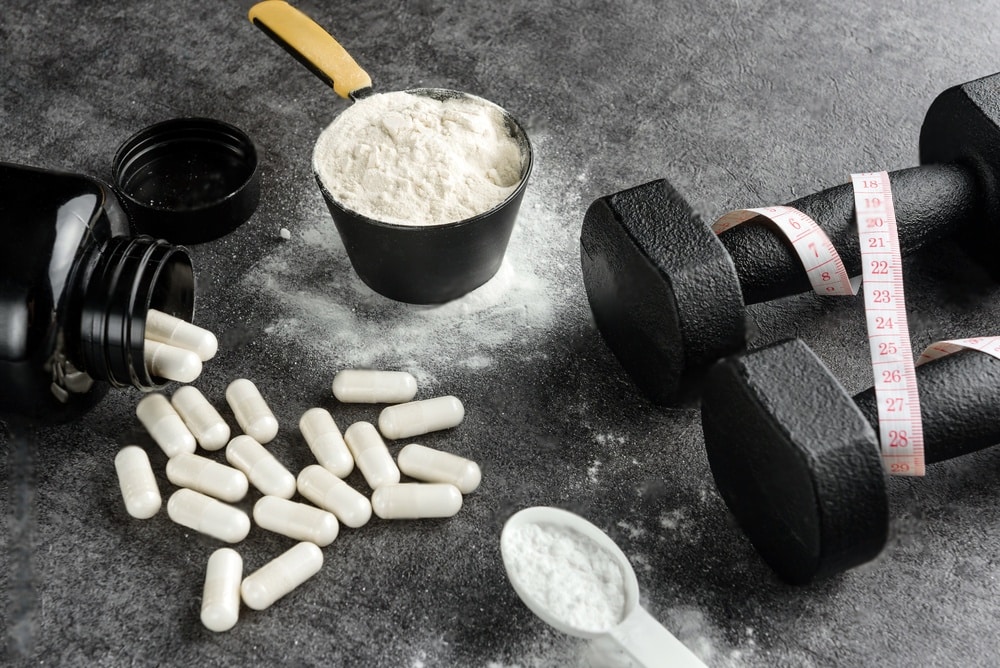Are you left wondering why your trips to the bathroom have increased since starting on creatine supplements? Interestingly, while renowned for enhancing athletic performance and muscle mass, creatine may influence your urination frequency. So, does creatine make you pee more?
This article aims to shed light on this intriguing side effect of creatine use, helping you decode the truth behind the science. Ready to dive in? Discover a lot more than just muscle gains here!
Content Highlights
- Creatine supplementation can lead to an increase in urine output due to increased water retention in the body.
- Not all forms of creatine cause increased urination, and the effects on urination frequency can vary depending on the type and dosage of creatine used.
- Proper hydration is crucial for managing urination frequency while taking creatine; other dietary factors, such as salt intake and fiber consumption, may also play a role.
- Increased urination while taking creatine is generally safe and considered a temporary side effect, but it’s important to maintain proper hydration and adjust the dosage if necessary. Seek medical advice if experiencing unusual urinary symptoms.
What is Creatine and How Does It Work?
Creatine is a naturally occurring substance in our bodies, primarily found in skeletal muscles. It’s known for its vital role in energy production during intense physical activity such as weight lifting or sprinting.
The mechanism involves creatine phosphate donating a phosphate group to adenosine diphosphate (ADP) to form adenosine triphosphate (ATP). ATP is the principal energy source for cellular processes, meaning enhanced reserves boost your power and performance during workouts.
Moreover, this popular supplement is widely used by athletes and fitness enthusiasts to increase muscle mass and improve recovery after exercise. Despite its reputation as an effective addition to workout regimens, many people question whether creatine supplementation leads to increased urination—this piece explores that query and more about the workings of creatine.
How Creatine Affects Urination
Creatine affects urination by increasing water retention in the body, leading to higher urine output.
Increased Water Retention
One striking effect of creatine supplementation is the increased water retention in the body. This process begins when creatine pulls more water into muscle cells, a phenomenon known as cell volumization.
As your muscles absorb more water from your bloodstream, overall body hydration increases. The result? More fluid is available for urine production leading to higher urine output.
However, this shouldn’t raise an alarm; it’s part of how creatine functions. Notably, the weight gain often seen with creatine usage can be largely attributed to this increased total body water caused by cell volumization.
So while it might seem like you’re peeing more than usual, it’s just your body adjusting to and handling extra retained water efficiently.
Higher Urine Output
Creatine supplementation sees a direct influence on your urine output. This is largely due to the supplement’s impact on water retention in the body. The absorbed creatine pulls more water into your muscle cells, increasing their volume and increasing urine production.
Thus, while creatine itself doesn’t cause more frequent urination, its effect on the user’s hydration levels can indirectly lead to higher urine output. However, this increased frequency of urination does not necessarily equate with diuresis—excessive urination caused by specific diseases or substances—it simply hints at a user’s altered mineral and fluid balance resulting from taking high doses of creatine supplements.
Read More: Does Creatine Make You Fat?
Factors That Influence Urination Frequency While Taking Creatine
Several factors can influence urination frequency when taking creatine, including the type and dosage of creatine, individual hydration levels, and other dietary factors.
Type and Dosage of Creatine
Different types and dosages of creatine can have varying effects on urination frequency. Understanding the differences can help you manage this potential side effect while reaping the benefits of creatine supplementation. Here are some important points to keep in mind:
- Creatine Monohydrate: This is the most commonly used form of creatine and has been extensively studied for its effectiveness. It is generally safe and well-tolerated, with research supporting its role in enhancing athletic performance and increasing muscle mass.
- Other Forms of Creatine: Other forms of creatine are available, such as ethyl ester and buffered creatine, which claim to be more effective or cause fewer side effects. However, research is limited on these forms, and they may not offer any significant advantages over creatine monohydrate.
- Recommended Dosage: The typical dosage range for creatine supplementation is 3-5 grams daily for an average adult. This dosage effectively provides the desired benefits without causing excessive water retention or urination frequency.
- Loading Phase: Some people do a loading phase when starting creatine supplementation, which involves taking higher doses (around 20 grams per day) for a week or two before settling into the maintenance dosage. While this approach may accelerate the saturation of muscle stores initially, it can also lead to more frequent urination due to increased water retention.
- Hydration Levels: Your individual hydration levels can influence how much water your body retains while taking creatine. Staying adequately hydrated can help maintain proper urinary function and minimize excessive urination frequency.
Individual Hydration Levels
Proper hydration is key when it comes to the frequency of urination while taking creatine. Your body’s water can affect how often you need to go. If you are not drinking enough fluids, your urine output may decrease and become more concentrated.
On the other hand, if you are adequately hydrated, your body will naturally produce more urine to flush out waste products. So, staying well-hydrated is essential for maintaining a healthy urinary function while using creatine supplementation.
Remember to drink plenty of water throughout the day and monitor fluid intake to ensure optimal hydration.
Other Dietary Factors
Your dietary choices can also affect urination frequency while taking creatine. For instance, consuming a diet high in salt can lead to water retention and increased urine output. On the other hand, increasing your fiber intake can promote regular bowel movements and reduce urinary frequency.
Additionally, limiting protein-rich foods may help minimize the production of calcium in the urine, which could contribute to bone loss. It’s important to note that these factors may vary from person to person, so it is crucial to monitor and adjust accordingly for optimal results.
Debunking Common Myths About Creatine and Urination
Contrary to popular belief, not all forms of creatine cause increased urination. Discover the surprising truth about creatine and its impact on your bladder in this eye-opening article.
Not All Forms of Creatine Cause Increased Urination
Contrary to common belief, not all forms of creatine cause increased urination. This is a widely misunderstood myth surrounding creatine supplementation. While some types of creatine may lead to higher urine output due to increased water retention, it is not true for every form.
Scientific research has shown that different formulations and brands of creatine can have varying effects on urinary frequency. Therefore, it is important to note that the idea that creatine makes you pee more does not apply universally across all products available in the market.
Taking Too Much Creatine Can Lead to More Frequent Urination
Excessive consumption of creatine can result in an increased frequency of urination. Taking more creatine than your body needs can lead to higher levels of creatinine, a waste product that is eliminated through urine.
This can cause your kidneys to work harder and produce more urine. It’s important to note that this side effect is temporary and not harmful as long as you stay hydrated. To manage urination frequency while taking creatine, drink plenty of water throughout the day and consider adjusting your dosage if necessary.
Remember that individual hydration levels and other dietary factors also affect how often you need to pee when supplementing with creatine.
Read Also: Can You Take Creatine Before Bed?
Understanding the Role of Creatine in the Body
Creatine is vital in enhancing athletic performance, increasing muscle mass, and improving exercise recovery. Don’t miss out on uncovering the surprising benefits of creatine supplementation! Read more to discover its impact on your body.
Enhancing Athletic Performance
Creatine is widely known for its ability to enhance athletic performance. Scientific research consistently shows that supplementing with creatine can improve strength, power, and overall athletic performance.
It rapidly produces energy during high-intensity physical activity, allowing athletes to push harder and perform at their best. This makes creatine a valuable tool for both elite athletes looking for a competitive edge and recreational exercisers aiming to improve their fitness levels.
Whether it’s increasing muscular strength, improving endurance, or boosting explosive power, creatine has been proven to be an effective supplement for enhancing athletic performance.
Increasing Muscle Mass
Creatine supplementation is widely recognized as a powerful tool for increasing muscle mass. Numerous studies have shown that creatine effectively enhances protein synthesis, leading to greater gains in lean muscle mass.
This supplement provides additional energy during intense workouts, allowing for increased training volume and improved performance. As a result, individuals who take creatine consistently and combine it with resistance exercise can expect significant improvements in their overall muscle size and strength.
It’s important to note that while creatine can enhance muscle growth, proper training and nutrition are also crucial factors in achieving optimal results.
Improving Exercise Recovery
Creatine helps build muscle and increase performance and plays a crucial role in improving exercise recovery. After intense workouts, our muscles need time to repair and rebuild themselves.
This is where creatine comes into the picture. By replenishing ATP (adenosine triphosphate) stores in the muscles, creatine speeds up recovery, allowing for faster healing and reduced muscle soreness.
Numerous studies have shown that supplementing with creatine can enhance post-exercise recovery by reducing inflammation and oxidative stress while promoting muscle protein synthesis.
This means less downtime between workouts and more opportunities to push your limits in the gym or playing field.
Is Increased Urination While Taking Creatine Safe?
Increased urination while taking creatine is generally safe and considered a temporary side effect, but it’s important to maintain proper hydration to prevent potential complications.
Temporary Side Effect
One important thing to know is that increased urination is a temporary side effect of taking creatine. When you start supplementing with creatine, you may notice yourself making more trips to the bathroom than usual.
However, it’s worth noting that this is not specifically linked to the form of creatine you’re taking but rather due to water retention caused by its usage. Some individuals may experience increased urine output while using creatine, which can be attributed to the body holding onto more water.
So if you find yourself peeing more often after starting a creatine regimen, don’t worry – it’s just a passing phase and not something to be concerned about regarding your overall health and safety.
Importance of Maintaining Proper Hydration
Proper hydration is crucial when taking creatine supplements. While creatine does cause an increase in urine output, it is essential to maintain adequate hydration levels to prevent dehydration.
Contrary to popular belief, creatine supplementation increases total body water, ensuring your muscles are properly hydrated for optimal performance and recovery. Drinking enough fluids throughout the day can offset any potential fluid loss caused by increased urination while reaping the benefits of enhanced athletic performance and muscle growth that come with creatine supplementation.
Read More: Does Creatine Make You Bloated?
Tips for Managing Urination Frequency While Taking Creatine
To manage urination frequency while taking creatine, ensure you stay adequately hydrated, consider adjusting your creatine dosage if needed, and monitor other dietary factors that may contribute to increased urine output.
Stay Adequately Hydrated
To ensure a safe and comfortable experience while taking creatine, it is important to stay adequately hydrated. Hydration plays a crucial role in supporting the effects of creatine and minimizing potential side effects. Here are some tips for staying hydrated:
- Drink plenty of water throughout the day.
- Aim to consume at least 8 glasses (64 ounces) of water daily.
- Carry a water bottle with you to remind yourself to drink regularly.
- Don’t wait until you feel thirsty to drink water; thirst is often a sign that you are already dehydrated.
- Increase your fluid intake accordingly if you engage in intense physical activity or exercise.
- Try adding electrolytes to your water, especially if you sweat heavily during workouts or have prolonged exposure to high temperatures.
Consider Adjusting the Creatine Dosage
To optimize your creatine supplementation and manage urination frequency, it’s important to consider adjusting your creatine dosage. Here are some tips to keep in mind:
- Start with a lower dosage: If you’re experiencing frequent urination while taking creatine, starting with a lower dosage may be helpful. Gradually increase the dosage to find the right balance for your body.
- Split your dosage throughout the day: Instead of taking all your creatine at once, divide it into smaller doses spread throughout the day. This can help minimize any potential side effects, including increased urination.
- Experiment with different intake times: Some individuals find that taking creatine before a workout increases urination during exercise. Try adjusting the timing of your intake to see if it makes a difference in urinary frequency.
- Talk to a healthcare professional: If you’re concerned about urinary issues related to creatine usage, consider consulting with a healthcare professional or sports nutritionist. They can provide personalized guidance based on your specific needs and health profile.
Monitor Other Dietary Factors
To ensure optimal results and minimize any potential side effects while taking creatine, it is essential to monitor other dietary factors. Here are some key factors to consider:
- Stay aware of your protein intake: Creatine supplements are commonly used by athletes and fitness enthusiasts to support muscle growth. However, consuming excessive amounts of protein alongside creatine can strain the kidneys. Maintaining a balanced diet and not relying solely on high-protein foods or supplements is important.
- Balance your fluid intake: While creatine may increase water retention in the body, it’s crucial to maintain proper hydration levels by drinking enough water throughout the day. Adequate hydration helps flush out toxins and supports overall kidney health.
- Monitor sodium intake: Excessive sodium consumption can lead to water retention and potentially exacerbate any fluid-related side effects of creatine supplementation. Be mindful of your sodium intake from processed foods, salty snacks, and condiments.
- Maintain a varied diet: Consuming a wide range of fruits and vegetables ensures you receive essential vitamins, minerals, and antioxidants that contribute to overall health. Additionally, fiber-rich foods can help regulate digestion and prevent constipation, which can sometimes be associated with creatine use.
- Consider consulting a registered dietitian: If you have specific dietary concerns or questions regarding your nutrition while taking creatine, seeking guidance from a registered dietitian who can provide personalized recommendations based on your individual needs may be beneficial.
Seeking Medical Advice for Urinary Concerns While Taking Creatine
If you are experiencing urinary concerns while taking creatine, seeking medical advice and considering getting lab tests done to ensure your overall health and well-being is important.
Getting Lab Tests Done
To ensure your overall health and well-being while taking creatine, it’s important to get lab tests done periodically. These tests can help monitor your kidney function and ensure everything functions properly. Some specific lab tests that you may want to consider include:
- Kidney Function Tests: These tests measure various markers in your blood to assess how well your kidneys are working. This includes checking creatinine levels, a waste product filtered by the kidneys.
- Liver Function Tests: While creatine primarily affects the kidneys, monitoring liver function is always a good idea. To evaluate liver health, these tests assess different enzymes and proteins in your blood.
- Electrolyte Levels: Creatine supplementation can affect electrolyte balance, so checking levels of electrolytes such as sodium, potassium, and magnesium can be beneficial.
- Blood Pressure Monitoring: Creatine has been associated with increased blood pressure in some individuals. Regular blood pressure checks can help identify any changes or abnormalities.
Limiting Protein-rich Foods
Consuming protein-rich foods, such as meat and poultry, can contribute to creatine intake. However, if you’re concerned about urinary issues while taking creatine supplements, it may be worth considering limiting your consumption of these protein-rich foods.
While creatine is generally considered safe and has numerous health benefits, consuming large amounts of protein can increase creatinine levels, which may cause urinary concerns.
It’s important to strike a balance by incorporating various nutrient-rich foods into your diet while monitoring your protein intake.
Also Read: Creatine vs Pre-Workout: Unveiling the Powerhouses
Increasing Fiber Intake and Reducing Salt
- Including more fiber in your diet can help regulate bowel movements and improve overall digestive health.
- Consuming adequate fiber can prevent constipation and promote regularity in the bathroom.
- High-fiber foods such as fruits, vegetables, whole grains, and legumes are also nutrient-dense and beneficial for overall health.
- Reducing salt intake can help manage blood pressure levels and promote cardiovascular health.
- Excessive salt consumption can contribute to fluid retention, which may further increase urine output while taking creatine.
- Opting for low-sodium food choices and avoiding processed or packaged foods high in sodium can support a healthy balance of fluids in the body.
- Increasing fiber intake through sources like whole grain bread, oatmeal, chia seeds, and fresh produce can be an easy way to support digestive health while taking creatine supplements.
- Incorporating high-fiber snacks such as nuts, seeds, or raw vegetables into your daily routine can provide additional fiber without adding excess calories.
- Remember to gradually increase your fiber intake to allow your body time to adjust and avoid any potential digestive discomfort.
Frequently Asked Questions (FAQs)
Now let’s check out some common FAQs on this topic.
1. Does creatine make you pee more?
Yes, research has shown that taking creatine supplements can increase urine production and frequency of urination.
2. Why does creatine cause increased urination?
Creatine is processed by the body and converted into creatinine, which the kidneys must filter out. This process increases the amount of fluid that needs to be excreted as urine.
3. Is it normal to experience more frequent urination when using creatine?
Yes, increased urination is a common side effect of taking creatine supplements. It usually subsides as your body adjusts to the supplement.
4. Are there any other factors that can contribute to increased urination while using creatine?
In addition to the diuretic effect of creatine, factors such as hydration levels, individual metabolism, and dosage can also impact urinary frequency when taking this supplement. Staying well-hydrated and following recommended dosages for optimal results and minimal side effects is important.
Disclaimer: This content is for informational purposes only and does not replace professional medical advice, diagnosis, or treatment. This information is not comprehensive and should not be used to make health or well-being decisions. Consult a qualified healthcare professional with questions about a medical condition, treatment options, or health regimen. This website or the content should never replace professional medical advice.









































